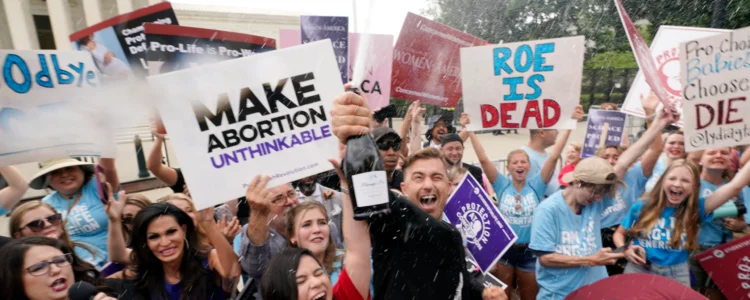
This past Saturday, June 24th, 2023, officially marked one year since the Dobbs v. Jackson decision, which reversed the infamous Roe v. Wade decision that federally mandated all states allow abortion. In a post-Roe America, the legality of abortions is decided at the state level, which infers that states can outlaw it entirely if its legislature desires to do so.
For many conservative states, this meant that they were no longer coerced into allowing pregnancy terminations, which in their eyes are “legal” murders. No longer were these governments forced to enact policies that conflicted with their deepest moral convictions. Acting against one of the most glaring ethical truths (that wrongfully taking another human life is immoral) was undoubtedly a traumatic experience for many.
Since June 24th, 2022, 13 states have passed legislation that has effectively banned abortion within their borders (per ABC News). Georgia has passed a ban beyond six weeks, and several other states, including Florida and Arizona, have passed abortion bans beyond 15 weeks.
Though blue states have seen an uptick in abortions due to laws in neighboring states, new data suggests roughly 25,000 abortions have been prevented nationwide since the Dobbs decision (see here). Other reports place this estimate as high as 30,000 in the first six months. Regardless, that is at least a full baseball stadium’s worth of children that will now have the opportunity to make a positive impact on the planet that would have otherwise been unjustly mutilated at the hands of an abortion clinic.
Unfortunately, many Americans do not see things this way. Pro-abortion advocates make the argument that outlawing abortions will put the lives of women at risk nationwide. They say that abortion is necessary to protect women from the dangers of pregnancy and giving birth.
Often times, these advocates will make the claim that pro-life legislation does not allow for exceptions to be made when the life of the mother is at risk. However, this claim is rooted in falsehood. Research conducted by the Charlotte Lozier Institute found that every state that outlawed abortion also allowed for circumstantial procedures to be performed in this tragic situation (see here).
The name pro-life is self-explanatory; the community seeks to protect life. In the unfortunate circumstance where a mother’s life is truly at risk, forcing her to go through with the childbirth and running the risk of losing both the mother and the child is not in the best interest of protecting life.
Perhaps as more time continues to pass since the Dobbs decision, the babies born that would have otherwise been aborted may inspire their respective mothers to think differently about the issue of abortion. As these children begin to grow and make their impact on the world, their stories may serve as the first domino in a new wave of thinking.
This generation of post-Roe babies will serve as tangible evidence of the infinite value of each and every human being, and as many of them become doctors, lawyers, teachers or whatever profession they choose, their impact will be accentuated by their story.
With more babies inevitably being saved as each year passes, the impact of the reversal of Roe v. Wade will grow exponentially. More and more children will rightfully be granted their right to life, and they have the same opportunity to experience God’s creation without being slaughtered before exiting the womb.
Though the fight will not stop until abortion is completely eradicated, the one-year anniversary of the Dobbs decision calls for a time of celebration for the unborn. It is a monumental milestone in recent American history, as well as being a glimpse of the ultimate goal of a pro-life America.
